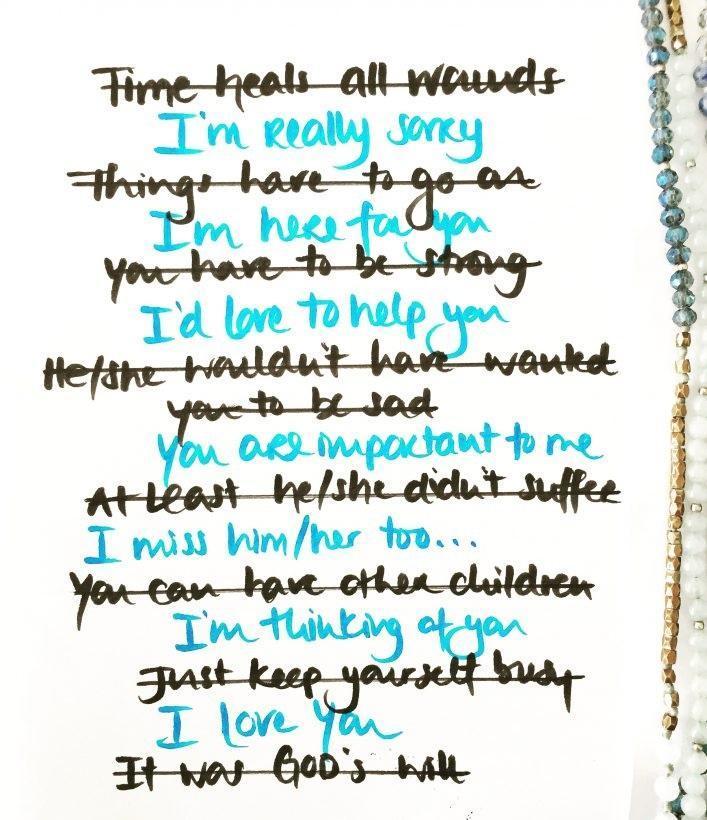It’s hard to know what to say when someone is grieving. We want to comfort them, but don’t know how or what they need us to do. This blog post will help guide you through the process of supporting someone who is grieving, along with practical tips for things you can say and do that will help make their journey a little easier.
Contents
Understanding The Grieving Process
Going through grief is like going on a journey. There are different stages that you will pass through until you reach the other side where healing begins to take place. Each person’s process of grieving may be somewhat unique, but there are some similarities among all people who experience loss and go through this difficult time in their life.
Some Common Signs

Some commonalities include:
- Feel as though you have been deeply hurt by what happened. You may feel extremely sad, lonely, abandoned, and even angry at times during this stage. Sudden death is especially difficult because there has been no time for any type of emotional preparation.
- Want to talk about your loved one all the time. You may find yourself bringing up their name over and over again, telling the same stories to different people. This is especially true in the early days after a loss when memories are more vivid and raw. It will be important for you to have plenty of support available during this time so that you don’t feel alone with all your thoughts and feelings.
- Feel like you are in a fog or that time is standing still. This can be especially true in the early days and weeks after a loss when everything seems surreal and you can’t believe what has happened. As time goes on, the fog begins to lift and you start to realize that life must go on.
- Becoming preoccupied with the details of your loss. You may find yourself reading obituaries or looking up funeral information for no apparent reason. This is a normal part of the grieving process, so don’t worry if you can’t seem to stop thinking about things related to your loved one and their death.
- Experiencing physical symptoms such as sleeplessness, fatigue, changes in appetite, and headaches. All of these are normal reactions to the stress of grief.
Supporting Your Loved One Who’s Grieving

When someone we love dies, it feels like a part of us has died as well. We can’t help but feel their loss deeply and want to do whatever we can to make them feel better. In addition, many of us may feel guilty or inadequate because we think that we should be able to fix things or make the pain go away.
But unfortunately, there is no right or wrong way to grieve and there is no magic formula for healing. The most important thing you can do is to be there for your loved ones and let them know that you are available to listen whenever they need to talk.
How To Support Someone Who’s Grieving?
There are many ways that you can support someone who is grieving. Just being present with them and letting them know that you care is a good start. Here are some ideas for helping them through this difficult time:
Be Patient With Them
Remember that grief takes time—everyone grieves in his or her way at his or her own pace. Don’t expect your loved one to be “over it” in a certain amount of time.
Listen Without Judgment
It is important for the person grieving to feel like they can talk about their loved one and express their feelings without being judged or criticized. Let them know that you are there to listen and support them, not to give advice or tell them what they should be doing.
Validate Their Grief Feelings
Let your loved ones know that you understand and respect why they might be feeling angry, guilty, sad, anxious, or any other emotions that come with the grieving process. Letting someone who is hurting know that we get it can go a long way toward validating their feelings.
Help Them Feel Their Pain
Make themselves available for hugs, tears, and just being there. It can be comforting for the person grieving to know that they have someone they can rely on.
Don’t Take Their Feelings Personally
If someone you love is grieving, it may be difficult for you to know how to respond when they lash out at you or withdraw from the relationship in some ways. Remember that grief can cause people to act in unpredictable and uncharacteristic ways. Don’t take their reactions personally, and continue to be there for them.
Offer Practical Help
There are many practical things that you can do to help someone who is grieving. You might offer to run errands for them, cook them a meal, or just sit with them and keep them company.
Encourage Them For Seeking Help
Encourage them to seek out professional help if they are struggling to cope. Grief can be very overwhelming and it’s often helpful to have someone to talk to who is trained in helping people deal with loss.
Some Practical Tips
It can be difficult to know what to say or do when someone we love is grieving. Here are some practical tips that may help:
For Children
- Make sure they have plenty of opportunities to talk about their loved ones and what happened.
- Let them know it’s okay to be angry, sad, or scared and that these feelings are normal.
- Provide plenty of physical comforts such as hugs and kisses.
- Encourage them to play and be active, but don’t push them if they aren’t ready yet.
For Teenagers
- Provide opportunities for them to talk about their loved ones and express their feelings.
- Let them know that it’s okay to be angry, sad, or scared and that these are all normal responses after a loss.
- Help them find ways of keeping the memory of their loved one alive such as planting a memorial garden.
- Encourage them to be independent and do things without their loved ones such as going back to school, driving a car, etc.
For Adults
- Let them know it’s okay to still think about the person who died or talk with others about what happened. There is no right or wrong way to grieve.
- Encourage them to seek out professional help if they are struggling to cope.
- Make themselves available for hugs, tears, and just being there.
- Help them find ways of keeping the memory of their loved one alive such as writing a letter or making a photo album.
For Senior Citizens
- Encourage them to talk about their loved ones and what happened.
- Make sure they have plenty of opportunities for physical contact such as hugs, hand-holding, and kisses.
- Encourage them to reminisce about the good times they shared with their loved ones.
Things To Avoid Saying To Someone Who’s Grieving

While you might feel like saying something is helpful or comforting, there are certain things that we should avoid when someone we love is grieving:
- Don’t say “It’s time to move on.” Everyone grieves in their way and at their own pace. There isn’t a timeline for grief.
- Don’t say “You should be over it by now.” This is another message that you aren’t expected to get over the loss of a loved one right away; everyone grieves in his or her way and at his or her own pace.
- Don’t say “Be strong.” This implies that the person grieving should be putting on a brave face for your sake and not expressing their true feelings.
- Don’t say “It was meant to be.” No good can come from saying this to someone who has lost a loved one. It only adds to his or her pain.
- Don’t say “I know exactly how you feel.” No one can understand what someone is going through unless they have experienced the same loss themselves. Even if two people are experiencing the same type of loss, each person’s grief journey will be unique to him or her.
NOTE: While these may be true, they are not helpful to hear right now and can make the person feel worse. They make the person feel like they are being blamed for the death or that their loved one’s life was not worth grieving over.
Conclusion
Grief is a difficult process to go through and there is no right or wrong way to do it. Just be there for your loved ones and let them know that you are available to listen whenever they need to talk.
For more information, please contact MantraCare. Grief is a natural and complex emotional response to loss or change. If you have any queries regarding Online Grief Counseling experienced therapists at MantraCare can help: Book a trial therapy session


